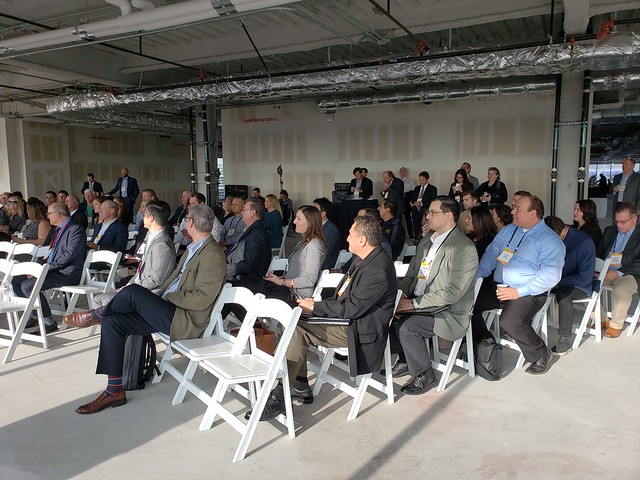A New Frontier: Developers Face Parking, Technology Challenges In New Projects
Greenberg Traurig shareholder Craig Glorioso says it is a pain to get his kids to drive.
Glorioso, who has a 20-year-old, a 19-year-old and a 16-year-old, said he has to entice and urge them to use and drive a car.

“They don’t want to do it,” Glorioso said at Bisnow’s Orange County Multifamily event. “They’d rather Uber, so it’s going to be interesting moving forward if there is less and less need for cars.”
Glorioso’s anecdote with his own children mirrors what many studies say about millennials, Generation Z and Americans' overall sentiment about cars.
With the advent and popularity of ride-sharing platforms like Uber and Lyft, as well as more electric vehicles and research being poured into self-driving cars, more people are less likely to buy new gas-guzzling cars and generally less reliant on automobiles. One study suggests private ownership of cars could drop 80% by 2030.
What does this mean for future commercial real estate development? Parking spaces will be an issue in the near future for developers, experts said.
More than 150 people attended Bisnow’s Orange County Multifamily event held Dec. 18 at the Greenberg Traurig headquarters in Irvine. At the event, panelists discussed the state of Orange County’s multifamily market, the industry's overall economic outlook and preparing projects for the future.
Right now, cities demand parking spaces, Shopoff Realty CEO Bill Shopoff said.
“We think it’s aggressive today,” Shopoff said. “What will happen five to 10 years from now?”
Shopoff said the trend is heading toward providing less parking and building more common area spaces but many cities have yet to jump on board.
While cities like San Francisco are repurposing old parking spaces and eliminating parking minimums and Los Angeles is relaxing parking requirements for the Angels Landing megaproject, some cities still require a certain number of parking spaces for new developments.
In Anaheim, a multifamily development in the city would require the developer to provide 1.25 parking spaces for studio units, two parking spaces for one-bedroom units, 2.25 spaces for two bedrooms and three parking spaces for three-bedroom units.
One above-ground parking space could cost as much as $35K, according to a 2014 UCLA study. Three parking spaces for a three-bedroom unit could run up as much as $100K.
Shopoff said since parking eats up so much of a project's cost, he hopes cities could see the trend and relax some of the parking requirements for new developments.

Another issue for developers is preparing for a possible influx of electric vehicles, TCA Architects President Aram Chahbazian said.
In 2017, Volvo announced it would ditch the internal combustion engine and build electric cars to rival Tesla. BMW last year opened a new factory for electric vehicle production. U.S. sales of electric vehicles jumped by 25% in 2017 from the previous year.
As more people buy electric vehicles, this means developers might need to provide a lot of charging stations and have the ability to handle all of that electricity, Chahbazian said.
“With the advent of more and more electric vehicles coming into apartment projects, the transformer might not be able to handle the load," Chahbazian said. "Things like that kind of detail are coming into play.”
One thing is for certain: For now, parking is still a very important part of a development, Alliance Residential Regional Vice President of Operations Sarah Dumas said.
Dumas said when she meets with tenants, parking availability is one of the first things they ask.
"A perfect formula [for parking] has not been determined yet," she said. "But it’s the No. 1 thing that impacts reputation score and overall that impacts business."
Check out photos of the event here:

